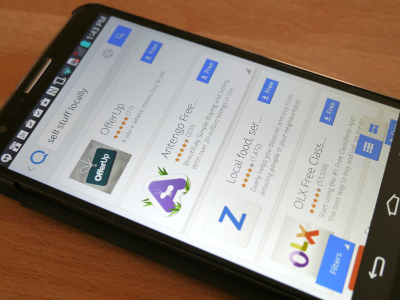
Mobile App Search Company Quixley has confirmed it has successfully raised $60 million in funding, valuing the company at $600 million.
According to Tech Crunch;
Quixey has been a longtime participant in the mobile search space, and develops a technology that goes beyond just connecting people with new applications. Instead, it’s also focused on helping people find the content found within applications. For example, if you were searching on mobile for something like Thai food, Quixey’s technology could return results from across apps, including things like Yelp reviews of restaurants or a Groupon deal. This technology, referred to in the industry as “deep linking,” is something that all the major tech players are taking advantage of today, including companies like Facebook, Google and Twitter, as well as startups like URX, Branch Metrics, Button, and many others. Read More...
Quixley’s unique selling point is their technology for “surfacing” the deep functionality of mobile apps.
“Surfacing” deep functionality is a critical step in the process of building a searchable catalogue of mobile apps. Mobile Apps are difficult to map, compared to websites.
The reason why websites are easier to catalogue, is that (almost) all websites are built on top of a common set of standards. The code which web servers send to web browsers (or search engines posing as browsers), contains all the information a search engine needs, to construct a catalogue of the website – it contains the description of how to draw the web page, and contains links to other web pages on the same website. A web search engine can usually extract pretty much all the data it needs to analyse a website, by asking the web server for the home page, then following the coded links to all the other pages on that website.
Mobile apps are different, because they are self contained software. There is no web server broadcasting the structure of the website to anyone who asks. Instead, to catalogue the pages of a mobile app, you have to install the mobile app on mobile phone, and start pressing buttons at random, to try to work out all the different things the mobile app can do.
Quixley has circumvented this limitation, by devising technology which tricks mobile apps into thinking they are running on a mobile phone – but actually, the mobile apps being analysed by Quixley are running on highly customised devices, which are designed to capture and catalogue all the screens presented by the mobile app during the analysis process.
Why go to all this trouble to open the hood on the mobile app, when you could simply read the description written by the mobile app developer? The answer is that it is always better to look for yourself, than to take someone’s word for it. The mobile app developer might have done a poor job of communicating what their mobile app does, or might even have overlooked describing elements of functionality which the catalogue provider thinks are really important.
Quixley’s future should be very interesting to watch – no doubt Google and other search businesses, are watching developments, and weighing their options.